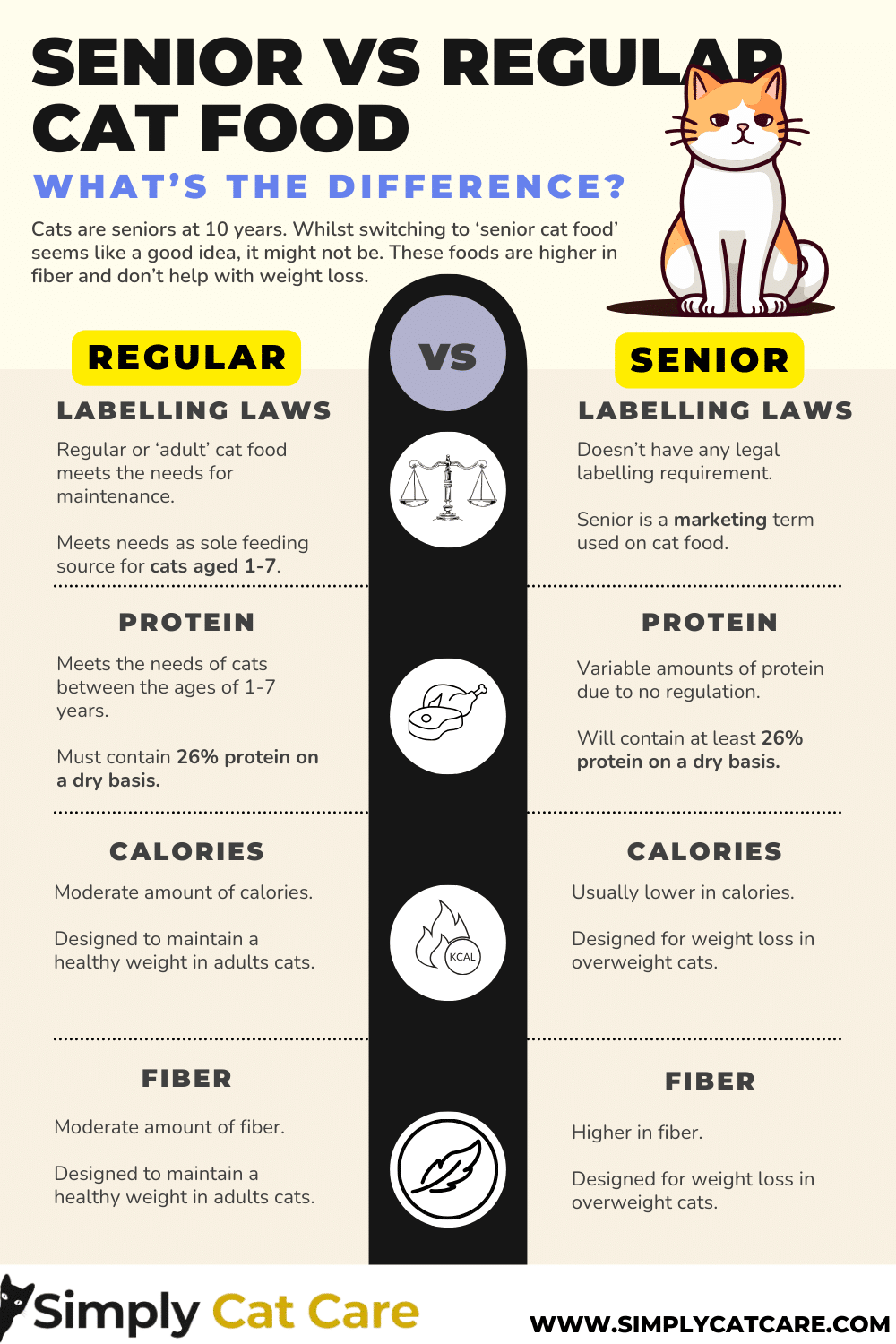What’s the difference comparing senior cat food vs regular cat food?
There’s little difference between senior and regular cat food.
Regular adult cat food for adult cats aged 1 to 7.
These foods meet the nutrient needs outlined by the Association of American Feed Control Officials (AAFCO) guidelines.
Foods marketed for senior cats follow no laws.
Senior cat foods are higher in fiber, which can help control weight.
A senior cat food isn’t the best for weight loss in elderly cats. High quality protein is what seniors need for muscle loss.
Want to make sure you’re making the right for your older cat?
Read on to make sure you’re getting your cats diet right.
Quick take-aways:
Does “Senior Cat Food” Actually Mean Anything?
Senior cat food doesn’t mean anything.
The term “senior” doesn’t have a legal definition and so cats may not benefit from this food.
AAFCO, a non-profit organization set cat nutrition guidelines for growth, adult and lactation.
Most states require cat foods labeled in certain ways to help people make informed choices.
One of these ways is the statement of nutritional adequacy, found on cat food labels.
This helps people choose the right food for their cats age as follows:
- Kittens: Age <1 years. Need for for growth or all life stages.
- Adults: Age 1 – 7 years. Need food for maintenance or all life stages.
Cat food for growth is higher in protein and calories. This helps kitten grow.
There are no nutrition guidelines past age 7.
That’s because there’s no consensus on what’s best for middle-aged cats and seniors.
Senior is a marketing term.
If you check the label, most of these foods are actually suited to adult maintenance.
But this could be a problem..
When Is a Cat Considered to Be Mature, Senior or Geriatric?
In short:
- Mature cats: 7 – 10 years.
- Senior cats: 10 – 12 years (some suggest cats are seniors at 12).
- Geriatric cats: 12+ years.
Why Do Mature, Senior, and Geriatric Cats Need to Be Fed Differently?
A senior cat’s dietary requirements differ from adult cats.
Senior is a marketing term.
So it means anything, and that’s usually bog-standard adult maintenance cat food.
Cats are seniors at 10 years (although some experts differ on this). The senior years can involve a decline in body condition and appetite.
Protein and fat digestion decrease in senior cats. Experts suggest increasing calories and protein for underweight seniors.
The problem?
Senior cat food is often the worst choice for this!
A research paper looking at 59 cat foods marketed as senior, found most had higher levels of fiber and less calories.
Whilst some foods available have the designation “11+”, which do seem to better match a seniors needs – most don’t (especially the 7+).
Some of these senior foods are also high in phosphorus. Not ideal for kidney health (a common problem in senior cats).
Is Senior Cat Food Necessary?
No, senior cat food isn’t needed.
If your cat is overweight, reduce calories.
Wet cat food is best choice, with four times fewer calories than dry cat food.
Senior cat food is lower in calories. Not a bad choice for weight loss, but research suggests the calories vary widely.
This goes back to the lack of regulation and laws around the term ‘senior’.
It can mean whatever the cat food manufacturers want it to mean.
As your cat ages past 10 they tend to lose weight.
To tackle that, you’ll want higher protein and calorie cat food on the plate.
A cats sense of smell and taste decline at this age, so choose palatable food.
Ironically for that – kitten food is a better option.
It’s tastier and more nutrient dense – perfect for skinny seniors that need more beef in the tin.
Should I Switch My Cat to Senior Food?
Senior cat food isn’t well regulated, so it’s hard to advise anyone to use it.
Instead, look for cat food that is appropriate for your older cats needs.
Choosing cat food suited to ‘all life stages’ ensures your cat gets high protein and calorie food.
Is Senior Cat Food Ok for Younger Cats?
No, senior food is not ideal for kittens and younger cats.
Kittens must eat a high calorie and protein diet. It’s critical their pet food is meeting the needs of ‘growth’.
High fiber food is less tasty in general, which isn’t going to help.
Accidentally Bought Senior Cat Food – Now What?
Senior food is fine for adult cats to eat.
Most senior cat food meets the needs for adult cat maintenance (check the statement of nutritional adequacy).
What to Feed an Older Cat That Is Losing Weight?
Look for cat food for all life stages.
Experts suggest increasing calories and protein. Cat food for ‘all life stages’ is better to meet these needs.
Final Thoughts on Senior Cat Food vs Regular
Senior cat food is a marketing term.
This type of food is higher in fiber. This can help with loss, but isn’t a good choice for senior cats if they’re losing weight.
There is no need to switch over to senior cat food, unless advised to by a veterinarian for health reasons.
Otherwise, your best option is to pick cat food suited to ‘all life stages’ and lower calories if cats gain weight.
Related articles:
- How to Fatten up an Old Cat?
- Best Cat Food for Older Cats With Bad Teeth
- Best Wet Cat Food for Senior Cats

